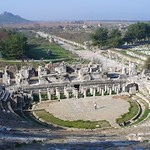Studies in Paul’s Prison Epistles – Acts 19:1-22
Note: Before his imprisonment Paul had spent over two years preaching and ministering in the city of Ephesus. This city was one of the three most populace cities of the ancient world, and its temple of Artemis was considered one of the Seven Wonders of the ancient World. Artemis was a fertility goddess of the time.
H – E – A – R – D
See also: Acts 2:38; 5:15; 1 John 4:1-2; Eph. 1:1; Ezekiel 3:17-18; Joel 2:28
Holy Spirit – vs. 1-7 — In Ephesus the Spirit was present, but believers needed to experience the Spirit in their individual lives. As immersed believers they had the Sprit, and with the apostolic blessing they had the miraculous power of the Sprit.
Evangelism – vs. 8 — Paul remained in Ephesus for the purpose of evangelism. He wanted to reach the world. If only the leaders of the church would desire to reach all in their community today, the world would begin to change for Christ.
Asian Province – v. 10 — Paul remained on in the province for more than two years, and with the help of other Christians many more were won to Christ. The text says all heard. Have all within our community heard the good news?
Remarkable restoration – v. 11-12 — In the Christian community under the leadership of the Apostle Paul individuals were restored to health, sanity, well-being. Today’s church should be a womb for remarkable restorations.
Demonic Deliverance – v. 13-22 — Demonic powers continued to hold sway over the lives of many. They feared Paul as an adversary, but the hypocritical were no match for their powers. Today we must know where we stand if we are to deal with the forces of evil. Only if we prove to be genuine followers of Christ can we withstand the demonic spirits of the world.
Exemplary story: Pigeon Forge is a popular resort town I have visited. Family and friends relish trips there, since it boasts many souvenir shops. The town’s economy is driven by its tourist trade. Ephesus was a resort town, and its main attraction was one of the seven wonders of the ancient world, the temple of Artemis. Visitors could buy charms and trinkets from the temple that honored the goddess of fertility, Artemis. When Paul brought the Gospel to Ephesus, the very economy of the town was in jeopardy. People began to abandon their preoccupation with the worship of a goddess of trinkets for the worship of Jesus, the Son of the living God.


